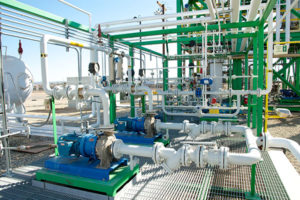SHV Energy, Oberon Fuels partner to reduce LPG’s carbon footprint
Oberon Fuels, a producer of ultra-low-carbon, renewable dimethyl ether (rDME) transportation fuel, and SHV Energy, a distributor of propane fuel, are partnering to accelerate the use of rDME to reduce the carbon footprint of transportation fuel, including propane autogas.

Oberon Fuels’ pilot DME production facility in Brawley, California. Photo courtesy of Oberon Fuels
Oberon Fuels has received more than $30 million in private funding since its founding in 2010. Additionally, the state of California in 2019 awarded Oberon a $2.9 million grant to upgrade its existing DME pilot facility to demonstration scale and facilitate the first production of rDME in the United States, with a target production capacity of about 1.6 million gallons of DME per year.
Building on this momentum, Oberon plans to leverage the collaboration with SHV Energy in three ways:
- Funding will augment the grant to further develop DME fueling infrastructure and vehicle development.
- SHV Energy’s technical resources will help test the use of rDME blended with propane.
- SHV Energy’s global distribution network will facilitate greater use of rDME in numerous energy applications worldwide.
“Building upon our pioneering work launching renewable propane in 2018, we are excited by the opportunity to convert renewable and waste feedstocks to rDME,” says Bram Gräber, CEO of SHV Energy. “We believe rDME has significant potential to help us achieve our ambitions to be a leader in renewable energy, and we are looking forward to working with Oberon Fuels to bring this ultra-low carbon fuel to market.”
Under ambient conditions, rDME is a gas but can be stored as a liquid under moderate pressure, which makes DME ideal for blending with propane.
A 20 percent blend of rDME reduces propane’s carbon intensity (CI) value from 83 gCO2e/MJ to 11 gCO2e/MJ. DME’s easy handling properties also make fueling and infrastructure relatively simple and inexpensive, according to Rebecca Groen, director of biofuels at SHV Energy.
“rDME’s dual benefits – its ability to reduce the CI of propane, as well as its ease of interoperability with propane infrastructure – make it an ideal option for the propane industry as it seeks to reduce the carbon footprint of an already clean, efficient option,” she says.
DME is approved as a renewable fuel under the U.S. Environmental Protection Agency’s Renewable Fuel Standard program, making it eligible for renewable identification number (RIN) credits when made from biogas by the Oberon process. California Air Resources Board estimated that dairy manure converted to DME by the Oberon process has a CI of -278 gCO2e/MJ. To compare, ultra-low-sulfur diesel has a CI of 100 gCO2e/MJ.
“This collaboration is a testament to the power of the rDME molecule as an innovative solution to address emissions and climate change,” says Rebecca Boudreaux, president of Oberon Fuels. “The very same rDME molecule can be used in multiple ways in the transportation sector to help fleets, businesses and governments reduce their carbon footprint and their long-standing reliance on petroleum-based fuels.”















